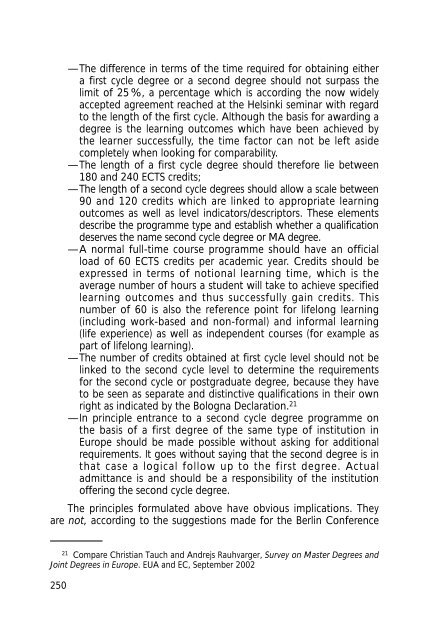Final Report Pilot Project - Relaciones Internacionales de la ...
Final Report Pilot Project - Relaciones Internacionales de la ...
Final Report Pilot Project - Relaciones Internacionales de la ...
Create successful ePaper yourself
Turn your PDF publications into a flip-book with our unique Google optimized e-Paper software.
—The difference in terms of the time required for obtaining either<br />
a first cycle <strong>de</strong>gree or a second <strong>de</strong>gree should not surpass the<br />
limit of 25 %, a percentage which is according the now wi<strong>de</strong>ly<br />
accepted agreement reached at the Helsinki seminar with regard<br />
to the length of the first cycle. Although the basis for awarding a<br />
<strong>de</strong>gree is the learning outcomes which have been achieved by<br />
the learner successfully, the time factor can not be left asi<strong>de</strong><br />
completely when looking for comparability.<br />
—The length of a first cycle <strong>de</strong>gree should therefore lie between<br />
180 and 240 ECTS credits;<br />
—The length of a second cycle <strong>de</strong>grees should allow a scale between<br />
90 and 120 credits which are linked to appropriate learning<br />
outcomes as well as level indicators/<strong>de</strong>scriptors. These elements<br />
<strong>de</strong>scribe the programme type and establish whether a qualification<br />
<strong>de</strong>serves the name second cycle <strong>de</strong>gree or MA <strong>de</strong>gree.<br />
—A normal full-time course programme should have an official<br />
load of 60 ECTS credits per aca<strong>de</strong>mic year. Credits should be<br />
expressed in terms of notional learning time, which is the<br />
average number of hours a stu<strong>de</strong>nt will take to achieve specified<br />
learning outcomes and thus successfully gain credits. This<br />
number of 60 is also the reference point for lifelong learning<br />
(including work-based and non-formal) and informal learning<br />
(life experience) as well as in<strong>de</strong>pen<strong>de</strong>nt courses (for example as<br />
part of lifelong learning).<br />
—The number of credits obtained at first cycle level should not be<br />
linked to the second cycle level to <strong>de</strong>termine the requirements<br />
for the second cycle or postgraduate <strong>de</strong>gree, because they have<br />
to be seen as separate and distinctive qualifications in their own<br />
right as indicated by the Bologna Dec<strong>la</strong>ration. 21<br />
—In principle entrance to a second cycle <strong>de</strong>gree programme on<br />
the basis of a first <strong>de</strong>gree of the same type of institution in<br />
Europe should be ma<strong>de</strong> possible without asking for additional<br />
requirements. It goes without saying that the second <strong>de</strong>gree is in<br />
that case a logical follow up to the first <strong>de</strong>gree. Actual<br />
admittance is and should be a responsibility of the institution<br />
offering the second cycle <strong>de</strong>gree.<br />
The principles formu<strong>la</strong>ted above have obvious implications. They<br />
are not, according to the suggestions ma<strong>de</strong> for the Berlin Conference<br />
21 Compare Christian Tauch and Andrejs Rauhvarger, Survey on Master Degrees and<br />
Joint Degrees in Europe. EUA and EC, September 2002<br />
250


